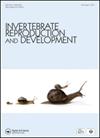The pre-oviposition period is associated with ovary maturation in Cryptolaemus montrouzieri Mulsant, 1850 (Coleoptera: Coccinellidae)
IF 0.8
4区 生物学
Q4 REPRODUCTIVE BIOLOGY
引用次数: 0
Abstract
ABSTRACTThe pre-oviposition period is critical in the development of reproductive organs in ladybirds, but there is little information about the main causes of this period. The pre-oviposition period in the ladybird Cryptolaemus montrouzieri was influenced by prey consumption, suggesting that there is a nutritional aspect from food intake that must affect ovary maturation after adult emergence. We also investigated whether feeding on non-prey food affects the maturation of ovaries. We have found that newly emerged females of C. montrouzieri have no developed ovary, and when feeding on adults of the mealybug Planococcus citri and in the absence of males, 5 days are required for full ovary development and egg maturation. Females feeding only on honey did not develop ovarioles even in 7 days. The ovarioles developed in each female on each side of the ovary is around 10 on a daily basis, with no significant difference between the left and the right side each day. On the fifth day, a great number of mature eggs were found, remaining constant on the following sixth day. Our results suggest that food quality, rather than just feeding, is a fundamental step to start the physiological chain that is responsible for the ovary development.KEYWORDS: Ladybugovariesdevelopmentovipositionallocation AcknowledgmentsWe thank Melyssa Gabriely Silva, Jorge de Oliveira Gomes Júnior and Helloyza Morais Rodrigues da Silva for their assistance in the complementary experiment and further data collection.Disclosure statementNo potential conflict of interest was reported by the authors.产卵前期与卵巢成熟的关系(鞘翅目:瓢虫科)
摘要产卵前期是瓢虫生殖器官发育的关键时期,但关于产卵前期的主要原因却知之甚少。蒙氏隐瓢虫的产卵前期受猎物摄取量的影响,这表明食物摄取量在营养方面影响了成虫羽化后卵巢的成熟。我们还研究了进食非猎物食物是否会影响卵巢的成熟。我们发现新出的montrouzieri雌虫没有成熟的卵巢,在没有雄虫的情况下,以柑橘扁球菌成虫为食,卵巢完全发育和卵子成熟需要5天。仅以蜂蜜为食的雌性在7天内没有卵巢发育。每只雌性卵巢两侧每天发育的卵巢在10个左右,左右两侧每天无明显差异。在第五天,发现了大量成熟的卵,并在接下来的第六天保持不变。我们的研究结果表明,食物质量,而不仅仅是喂养,是启动负责卵巢发育的生理链条的一个基本步骤。我们感谢Melyssa Gabriely Silva、Jorge de Oliveira Gomes Júnior和Helloyza Morais Rodrigues da Silva在补充实验和进一步数据收集方面的帮助。披露声明作者未报告潜在的利益冲突。
本文章由计算机程序翻译,如有差异,请以英文原文为准。
求助全文
约1分钟内获得全文
求助全文
来源期刊
CiteScore
1.90
自引率
0.00%
发文量
21
审稿时长
>12 weeks
期刊介绍:
Invertebrate Reproduction & Development ( IRD) presents original research on the reproductive and developmental biology of the Invertebrata, both embryonic and postembryonic. IRD welcomes papers reporting significant results obtained using new techniques. Encouraged topic areas include: aquaculture, physiology, biochemistry, functional morphology, phylogeny, behavioural and regulatory mechanisms, including genetic, endocrine and molecular studies. Papers containing qualitative descriptions of reproductive cycles and gametogenesis will not be considered. IRD is published in association with the International Society of Invertebrate Reproduction and Development.

 求助内容:
求助内容: 应助结果提醒方式:
应助结果提醒方式:


